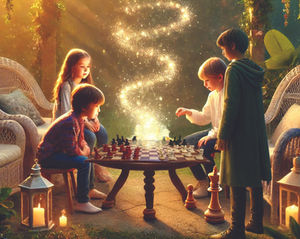The Reincarnation of the Game of Chess
- Javier Romano

- Nov 28, 2018
- 3 min read
Updated: Mar 9, 2025
It is remarkable that the civilisation that introduced the world to the very concept of reincarnation also gave us a board game that would eventually spread to the four corners of the globe.
Perhaps it is also ironic that this game originally began as a four-player contest—The Game of Four Seasons—only to evolve, over centuries, into the two-player version we now know. In the process, it discarded the use of dice and was gradually shaped by Persian, Arab, and Greek influences before making its way into Europe via Moorish Spain.
Today, we are privileged to witness a revival—a natural evolution—of that ancient game. Chess remained unchanged for centuries, but like all things, once it reached the peak of its development, it was bound either to decline or to transform into something more complex and complete.
The signs of its inevitable transformation—perhaps better described as a ‘transmutation’—are not yet universally recognized, much like the eventual necessity of replacing fossil-fuel-powered cars with more sustainable alternatives. Just as the steam locomotive was once essential until a more efficient engine replaced it, chess too has reached a point where it must adapt to new challenges.

With the advent of the computer age, technology made it possible to program machines to play chess, eventually surpassing human players. This was not a failure of human intelligence but rather an indication that the traditional game had become obsolete as a tool for intellectual growth. The human mind requires new challenges to evolve—not merely in a rational sense, engaging only the left hemisphere of the brain, but in a way that promotes holistic development.
This shift signaled the need to refine the rules and structure of chess so that it could more accurately reflect the complexities of contemporary society—including political and economic shifts, and, most importantly, the awakening of a new global consciousness.
Many people perceive chess as a purely intellectual, quasi-scientific pursuit, one dominated by mathematical geniuses—an intimidating image that discourages many from even attempting to play.
Paraphrasing one of its creators, Quaternity reintroduces the human dimension to the game. It revives the joy of play, fostering shared moments with family and friends, while still preserving the fundamental wisdom of the millennia-old tradition.
Unlike traditional chess, where predicting an opponent’s next move is often possible, Quaternity makes such foresight nearly impossible. This unpredictability can be unsettling for rigid thinkers, as I discovered firsthand in England when attempting to explain the rules to a retired chess grandmaster. His only response was: “But it’s so chaotic!”
‘Be that as it may’—a phrase often heard in these latitudes—life continues its evolutionary cycle. As Khalil Gibran wisely put it, “It does not stop at yesterday.”
More than just a game, Quaternity is an exercise in breaking free from prejudices and rigid thought patterns. Unlike traditional chess, where each turn consists of a single move before play returns to you, here, three other moves will take place before your turn comes again. By then, the board will have shifted dramatically, requiring you to rethink your tactics, adapt to new circumstances, and even overhaul your entire strategy. Sound familiar?
For these reasons and more, Quaternity is not just a form of entertainment—it is a training ground for strategic, lateral (out-of-the-box), and intuitive thinking alike.
A game that has already begun to ‘conquer’ the world, inspiring players of all ages—from Brazil to the former Soviet Union, from Australia to Canada.
Will Quaternity ever replace traditional chess?
Wait, play, and see for yourself.
J. Romano Nov. 2018








Comments